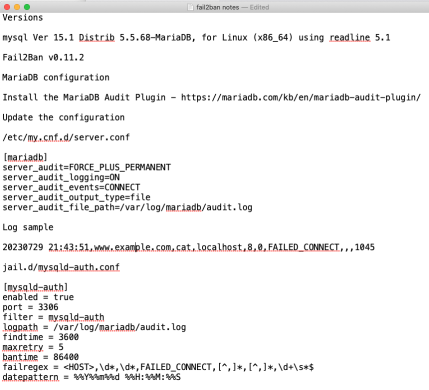
Ibexa 4.6 on Rocky 9 - PHP packages
Jul 13th
Apologies for the short post. I had trouble with GD - the issue was that I had php-gd instead of php82-gd
php82-8.2-5.el9.remi.x86_64
php82-php-8.2.21-1.el9.remi.x86_64
php82-php-cli-8.2.21-1.el9.remi.x86_64
php82-php-common-8.2.21-1.el9.remi.x86_64
php82-php-fpm-8.2.21-1.el9.remi.x86_64
php82-php-gd-8.2.21-1.el9.remi.x86_64
php82-php-intl-8.2.21-1.el9.remi.x86_64
php82-php-mbstring-8.2.21-1.el9.remi.x86_64
php82-php-mysqlnd-8.2.21-1.el9.remi.x86_64
php82-php-opcache-8.2.21-1.el9.remi.x86_64
php82-php-pdo-8.2.21-1.el9.remi.x86_64
php82-php-sodium-8.2.21-1.el9.remi.x86_64
php82-php-xml-8.2.21-1.el9.remi.x86_64
php82-runtime-8.2-5.el9.remi.x86_64
Error messages:
[2024-07-13T20:46:04.111489+00:00] request.CRITICAL: Uncaught PHP Exception Symfony\Component\Validator\Exception\LogicException: "Corrupted images detection requires installed and enabled GD extension."
[2024-07-13T21:54:31.829868+00:00] request.CRITICAL: Gd driver not installed {"exception":"[object] (Imagine\\Exception\\NotSupportedException(code: 0): Gd driver not installed

Rocky Linux 9 - wkhtmltopdf
Jul 7th
I kept getting a divide by zero error (Signal 8) with wkhtmltopdf under Rocky Linux
RPM in use: wkhtmltox-0.12.6.1-2.almalinux9.x86_64.rpm (credit to: https://forums.rockylinux.org/t/need-to-install-wkhtmltopdf-for-rocky-linux-9-how/6758/2)
This was running under Ibexa, with Symfony.
I stripped it down to test with the output of the application on the command line and isolated the issue to a <link> tag for Bootstrap 4.3 by commenting out tags until I found which one was causing the issue.
I don't care what the issue was - upgrading Bootstrap to 4.6 worked
I hope this helps someone - it was frustrating.

HP EliteBook - Rocky 9 - wifi
May 23rd
TL;DR
Detected Intel(R) Centrino(R) Ultimate-N 6300 AGN, REV=0x74
Error and other messages:
- iwlwifi 0000:44:00.0: Failed to run INIT ucode: -110
- iwlwifi 0000:44:00.0: Direct firmware load for iwlwifi-6000-6.ucode failed with error -2
- iwlwifi 0000:44:00.0 wlo1: renamed from wlan0
- wlan0: Failed to initialize driver interface
- Could not read interface wlan0 flags: No such device
What fixed it
New driver from: https://www.intel.com/content/www/us/en/support/articles/000005511/wireless.html
cd /lib/firmware
tar xzf iwlwifi-6000-ucode-9.221.4.1.tgz
cd iwlwifi-6000-ucode-9.221.4.1
cp iwlwifi-6000-4.ucode .
grubby --update-kernel=ALL --args="net.ifnames=0"
reboot
grubby config
grubby --info="/boot/vmlinuz-$(uname -r)"
index=0
kernel="/boot/vmlinuz-5.14.0-427.16.1.el9_4.x86_64"
args="ro crashkernel=1G-4G:192M,4G-64G:256M,64G-:512M resume=/dev/mapper/rl-swap rd.lvm.lv=rl/root rd.lvm.lv=rl/swap rhgb quiet $tuned_params net.ifnames=0"
root="/dev/mapper/rl-root"
initrd="/boot/initramfs-5.14.0-427.16.1.el9_4.x86_64.img $tuned_initrd"
title="Rocky Linux (5.14.0-427.16.1.el9_4.x86_64) 9.4 (Blue Onyx)"
id="505981e752ed473f8137b15a168da91b-5.14.0-427.16.1.el9_4.x86_64"
What was wrong? It needed a new device driver from Intel (thanks Intel!) and the renaming had to be shut off (thanks https://forums.linuxmint.com/viewtopic.php?t=303841)
This took many hours - I hope you find it helpful. :)

ibexa - stimulus - webpack
Feb 13th
It's 4:20a - please excuse this post ...
I wanted to use the ibexa REST API to dump the content types
So - I needed to add some JavaScript. Stimulus was there, so I figured I'd use it. It's cool.
I haven't worked with this stuff ... ever
I had to upgrade webpack or encore or something
Which identified path issues in the ibexa CSS and SCSS
I was hoping it would be quicker to fix the issues than ... not fix them, so I tried and am posting the results here so that eventually I can fork the repo and make a proper pull request
If you're looking for a rough example of working with Stimulus, Symfony and the Ibexa REST API - https://github.com/bgamrat/improved-journey/commit/c2ee360c8167395e4a1d5af7992ea1e0bf921124
If you found this helpful - yay :)
vendor/ezsystems/ezplatform-admin-ui-assets/Resources/public/vendors/alloyeditor/dist/alloy-editor/assets/alloy-editor-atlas.css
3,7c3,7
< src:url('./fonts/alloyeditor-atlas.eot');
< src:url('./fonts/alloyeditor-atlas.eot?#iefix') format('embedded-opentype'),
< url('./fonts/alloyeditor-atlas.woff') format('woff'),
< url('./fonts/alloyeditor-atlas.ttf') format('truetype'),
< url('./fonts/alloyeditor-atlas.svg#alloyeditor-atlas') format('svg');
---
> src:url('fonts/alloyeditor-atlas.eot');
> src:url('fonts/alloyeditor-atlas.eot?#iefix') format('embedded-opentype'),
> url('fonts/alloyeditor-atlas.woff') format('woff'),
> url('fonts/alloyeditor-atlas.ttf') format('truetype'),
> url('fonts/alloyeditor-atlas.svg#alloyeditor-atlas') format('svg');
vendor/ezsystems/ezplatform-richtext/src/bundle/Resources/public/scss/_alloyeditor-ez.scss
3,7c3,7
< src: url('../fonts/alloyeditor-ez.eot');
< src: url('../fonts/alloyeditor-ez.eot?#iefix') format('embedded-opentype'),
< url('../fonts/alloyeditor-ez.woff') format('woff'),
< url('../fonts/alloyeditor-ez.ttf') format('truetype'),
< url('../fonts/alloyeditor-ez.svg#alloyeditor-ez') format('svg');
---
> src: url('/bundles/ezplatformrichtext/fonts/alloyeditor-ez.eot');
> src: url('/bundles/ezplatformrichtext/fonts/alloyeditor-ez.eot?#iefix') format('embedded-opentype'),
> url('/bundles/ezplatformrichtext/fonts/alloyeditor-ez.woff') format('woff'),
> url('/bundles/ezplatformrichtext/fonts/alloyeditor-ez.ttf') format('truetype'),
> url('/bundles/ezplatformrichtext/fonts/alloyeditor-ez.svg#alloyeditor-ez') format('svg');
vendor/ezsystems/ezplatform-admin-ui/src/bundle/Resources/public/scss/_preview.scss
115c115
< background: url('../img/preview-tablet.png') top center no-repeat;
---
> background: url('/bundles/ezplatformadminui/img/preview-tablet.png') top center no-repeat;
127c127
< background: url('../img/preview-mobile.png') top center no-repeat;
---
> background: url('/bundles/ezplatformadminui/img/preview-mobile.png') top center no-repeat;
vendor/ezsystems/ezplatform-admin-ui/src/bundle/Resources/public/scss/_login.scss
18c18
< background-image: url('../img/login-background.jpg');
---
> background-image: url('/bundles/ezplatformadminui/img/login-background.jpg');
vendor/ezsystems/ezplatform-admin-ui/src/bundle/Resources/public/scss/_error-page.scss
64c64
< background-image: url('../img/errors/background.png');
---
> background-image: url('/bundles/ezplatformadminui/img/errors/background.png');
Also - I had to reset my password for this blog for the umpteenth time ...
